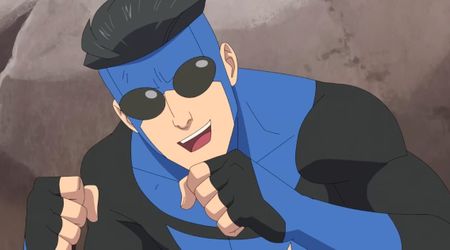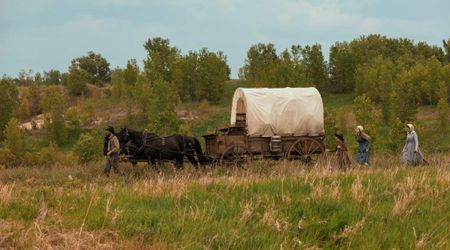'Star Trek: Picard' Episode 1 Review: 'Remembrance' sees Patrick Stewart at his best in a fresh new story

Spoiler alert for ‘Star Trek: Picard’ Season 1 Episode 1 ‘Remembrance’
In the opening scene of ‘Star Trek: Picard,’ Admiral Jean-Luc Picard (Patrick Stewart) dreams of a poker match with Data (Brent Spiner). An observant Picard notes that Data has a tell, of sorts. Data puts on an act when he wants Picard to think Data’s bluffing, but when the android is actually bluffing, his face is completely neutral. Data, at a loss, says, “Now that you’ve told me that, Captain, I am confused about which deception to employ.”
‘Star Trek: Picard’ feels a little bit like that. It feels like it’s had the observant eye of the fandom on it, and like it is confused about what story it means to tell. Is it a show that honors ‘Star Trek: The Next Generation,’ or one that subverts it? Does it hold to the original series’ peaceful, knowledge-seeking ideals, or are we in for a sci-fi action blockbuster? Like Data himself, however, the confusion doesn’t slow the showdown at all as it makes its play, and much like Data, it all somehow impossibly works.
Set 20 years after the events of ‘Star Trek: Nemesis’, which was the last time we saw the cast of ‘Star Trek: The Next Generation’ together. Admiral Jean-Luc Picard is living in peaceful retirement at a vineyard, spending his days with his pit bull terrier (named, charmingly, “No. 1”) and writing books about history. His Starfleet days are long behind him, despite his idyllic settings, he is anything but at peace. His bedroom is sparse, devoid of anything resembling a personal touch. He looks, in fact, like retirement is just another mission he’s been assigned, and he’s just carrying it out as best as he can until he can get back to doing proper work.
A quick but powerful interview that exposits the reasons he left Starfleet and the current political situation. His call to action comes in the form of Dahj (Isa Briones), a girl who might just be Data’s genetically engineered daughter in ways the show hasn’t fully explained, yet. Romulan assassins are after her, and following newly-awakened instincts, she seeks out Picard, but he’s unable to save her from an explosive death. She has a twin sister, however, Soji, and Picard is going to make it his mission to find her, and keep her safe. It’s not going to be easy, however, as Soji is at a ‘Romulan reclamation site', which turns out to be a Borg cube, the choice-of-transport to one of Picard’s greatest enemies.
The visual contrast to the old ‘Star Trek’ shows or even a lot of current shows on TV right now is stark. The episode is largely set on a futuristic Earth (not much space, yet), with glimpses of future versions of American cities. It is bright, and slick, and gorgeous. The modern feel of the show is everywhere and looks incredibly realistic.
While Picard isn’t being made out to be an action hero himself, the production quality of the action scenes implies that there will be more, the show will be taking its action scenes seriously. The fight scenes in this episode are fast-paced, sharp and cleverly takes advantage of the futuristic setting. Phasers are most decidedly not set to stun.
While the show does a lot of worldbuilding, gorgeous futuristic CGI and yes, great action scenes, the pilot’s greatest strength is in the number of times it allows itself to just step back and allow Patrick Stewart to act. Stewart’s performance is layered with complexity. The events of the past still anger him, but he still holds on to his willingness to believe the impossible and then work up from there. He continues to place faith in the people around him, including his new No. 1. While he is bitter about certain aspects of his past, neither his empathy, nor his sense of wonder has ever dimmed.
His scene with Dr Agnes Jurati (Alison Pill) was especially telling. It’s refreshing to see a show where information is openly shared in the pursuit of knowledge. Where people trust each other in the hopes of working towards a greater good. Even if Starfleet has fallen, its members still appear to want to work together, instead of just in their own self-interest.
Isa Briones as Dahj, in contrast, doesn’t really bring much to the table besides channeling the plot. It becomes clear as to why her performance as Dahj’s twin sister Soji is immediately filled with a lot more personality, and charisma. With Dahj being killed, it’s obvious Briones was reserving her action skills for the sister who lived, but it does take something away from the pilot episode for Dahj to be so lifeless.
It’s not the old ‘Star Trek.’ It feels fresh, but it builds on all that’s come before. While it’s got action, and danger, and a sinister plot, the story unfolds with a sense of gentleness, not unlike the show’s brilliant opening credits. There is a gently unfolding grand story to be told here. While it’s hard figuring out exactly what kind of story it’s going to be, the process of watching it unfold is a treat.
The next episode of ‘Star Trek: Picard’ airs on January 30 on CBS All Access.










